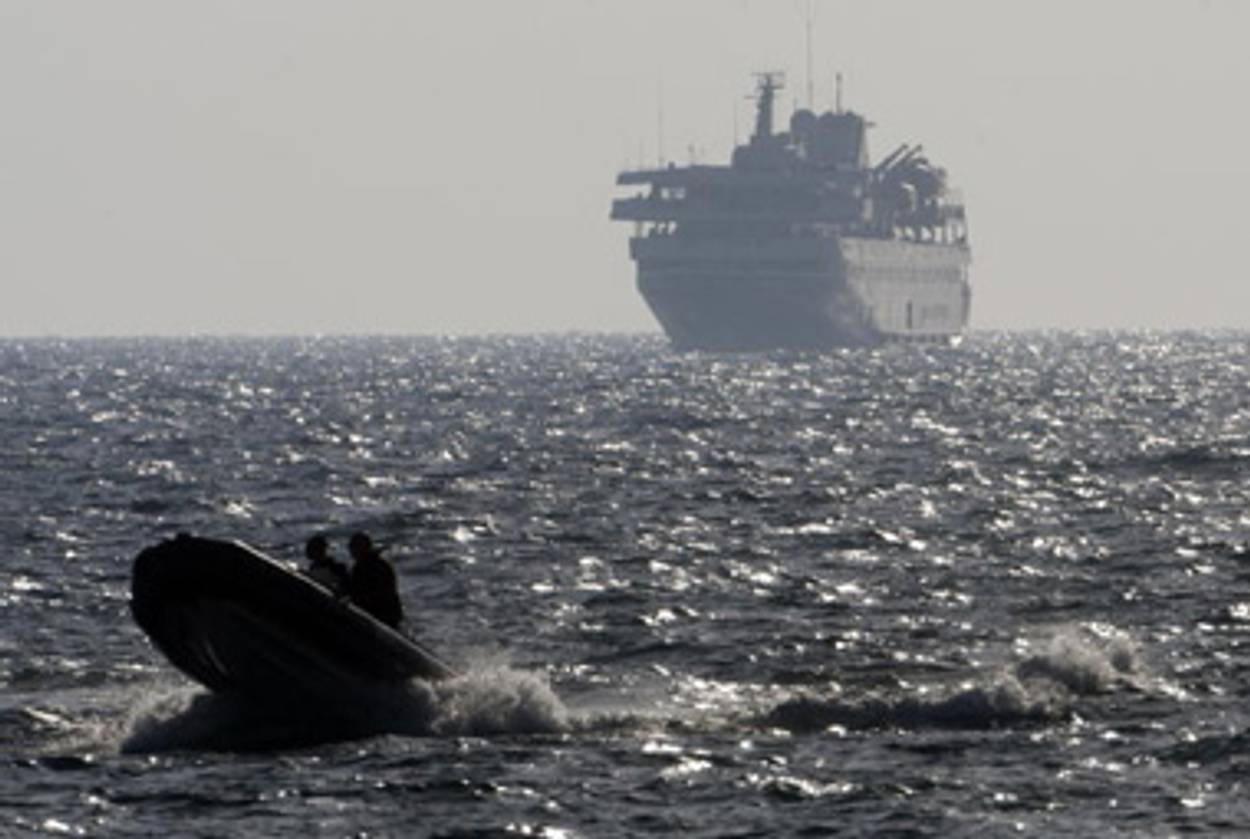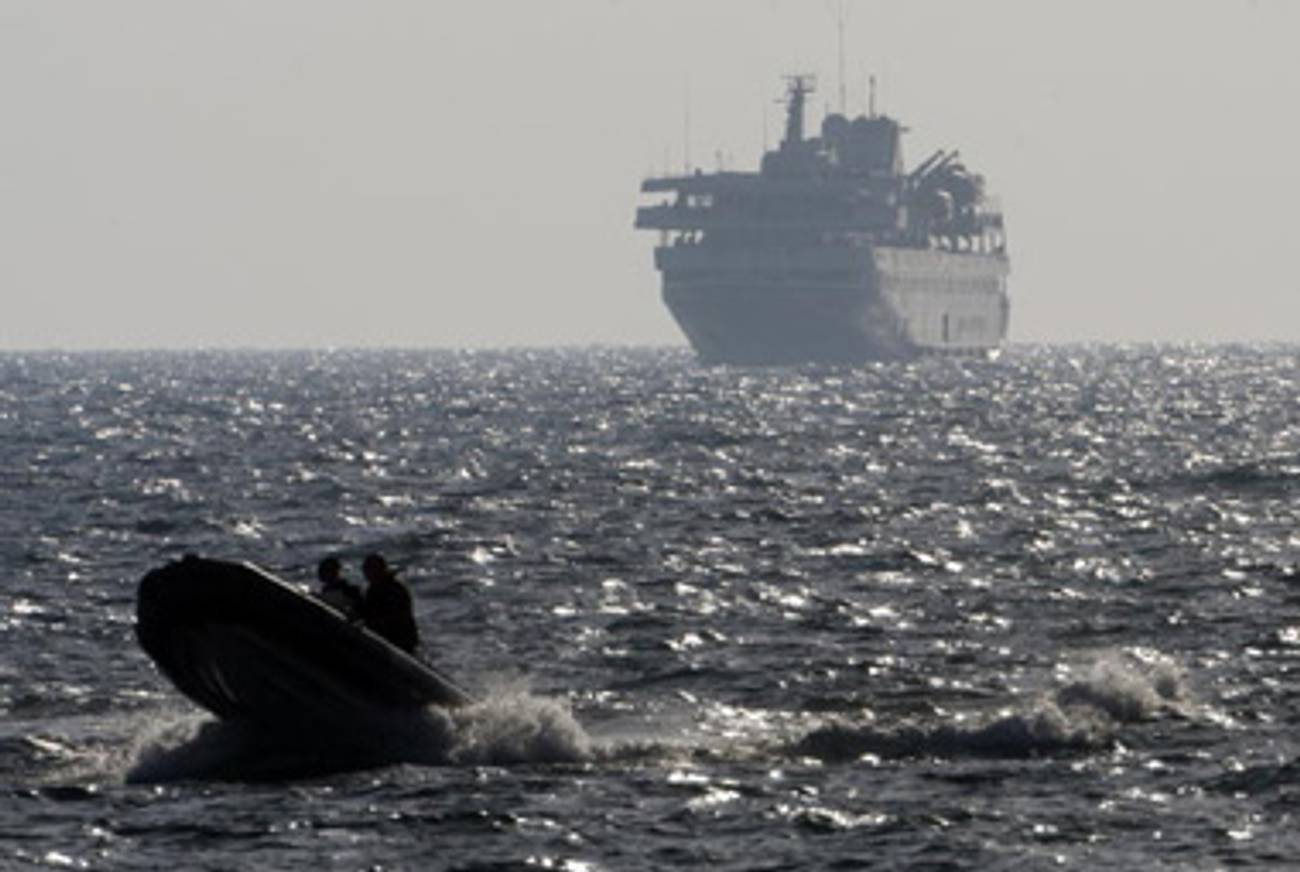Israel Bites the Bait
Assessing the fallout from yesterday’s raid on the ‘Freedom Flotilla’




On Monday, Israeli soldiers raided the “Freedom Flotilla” in international waters before it could run the Gaza Strip blockade, leading to nine civilian deaths and more injuries. Several IDF soldiers were injured, too; two of them, according to Ambassador Michael Oren, were seriously wounded.
It seems clear that these were not purely peaceful activists: This video, for example, shows IDF soliders being violently set upon immediately after boarding; and this one shows the on-boat “activists” revving themselves up beforehand with cries of, “The army of Mohammed will return!” (See also these.) The group behind the Flotilla is known for its Islamist leanings.
It also seems clear that, as the poet said, someone had blundered. This was a “provocation trap,” and boy did Israel fall for it. (In fact, Israeli defense officials are basically saying as much.)
For even if you are one who believes enforcing the blockade is moral, you can still join (prominent conservative) Max Boot in bemoaning this specific incident: “Israel’s actions in boarding the flotilla of ships bound for the Gaza Strip were entirely justified and perhaps even unavoidable,” he argues today. “Unfortunately they turned into a tactical and strategic fiasco that does further damage to the Jewish State’s tattered international reputation.”
The Flotilla Fiasco? It could end up something like the trumped-up “massacre” in Jenin, a non-event that Israel effectively rebutted and that has been all-but-forgotten by all except Israel’s most strident critics. It could be the thing remembered as having kicked off the Third Intifada and irrevocably changed the Mideast’s political landscape, and maybe its literal one, too. It could end up as pretty much anything in between.
What are the immediate consequences?
Prime Minister Netanyahu, who was in Canada, canceled what was to have been today’s White House visit (it will apparently be rescheduled). The prime minister and President Obama have spoken, with the Americans generally saying that they need to learn more facts before passing judgment; most other countries have not been so reticent and have condemned the raid. So far, the United States was able to water down what would have been a harsh U.N. Security Council condemnation into a statement that regrets “acts” and calls for an immediate and full investigation. Turkey had wanted the council to go much further.
Speaking of which: Say goodbye to any hopes for Israeli-Turkish amity in the near future. (Headline of the Day: “Israel-Turkey Friendship Society Suspends Activity.”) Prime Minister Erdogan called the raid “inhumane state terorrism”—well, if you say so, but then maybe it’s time for everyone to recognize the Armenian genocide, hmm?—and apparently the severing of diplomatic ties, with a NATO member that is traditionally Israel’s strongest Muslim ally, is not off the table. It’s worth noting that, in allowing the vessels to gather in waters near Cyprus, Turkey has long been a tacit ally of the flotilla.
As for the effect on Gaza, and the blockade? All I’ll note is that the peace process has seemed exclusively, almost to the point of myopia, concerned with resolving the West Bank and Jerusalem. This makes sense, to some extent: The Palestinian Authority is an almost infinitely more credible partner than Hamas is. At the same time, there was always that asterisk at the end of peace process hopes, and that asterisk, in the midst of these days of proximity talks, is going to take center stage.
Many (including myself—second bulletpoint) saw the tone-deafness of the Israeli response coming last week. From the beginning, the Israeli military decided to ratchet up the rhetoric against the Flotilla rather than simply say nothing and quietly let it through, or perhaps less quietly divert it to Ashdod, as had apparently been the plan.
Ah, but that is easy to write. What should Israel have done instead? I am no expert at maritime warfare, and nor is Tablet Magazine contributing editor Jeffrey Goldberg, but I still feel comfortable endorsing what he wrote yesterday:
There is a word in Yiddish, seichel, which means wisdom, but it also means more than that: It connotes ingenuity, creativity, subtlety, nuance. Jews have always needed seichel to survive in this world; a person in possession of a Yiddishe kop, a “Jewish head,” is someone who has seichel, someone who looks for a clever way out of problems, someone who understands that the most direct way—blunt force, for instance—often represents the least elegant solution, a person who can foresee consequences of his actions. …
The Jewish people have survived this long in part because of the vision of their leaders, men and women who were able to intuit what was possible and what was impossible. Where is this vision today?
It is out to sea.
Marc Tracy is a staff writer at The New Republic, and was previously a staff writer at Tablet. He tweets @marcatracy.
Marc Tracy is a staff writer at The New Republic, and was previously a staff writer at Tablet. He tweets @marcatracy.